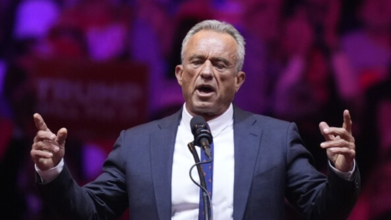- Health Conditions A-Z
- Health & Wellness
- Nutrition
- Fitness
- Health News
- Ayurveda
- Videos
- Medicine A-Z
- Parenting
How Has RFK Jr Changed The Vaccine Policies In The US?

U.S. Health Secretary Robert F. Kennedy Jr. has launched a sweeping overhaul of America’s vaccine policies. As per several reports, he has been moving faster than many government scientists, lawmakers, and health officials anticipated. His approach has also ignited controversy, sparked resignations, and fueled calls for his removal from office, while also energizing vaccine skeptics nationwide.
A Rapid Overhaul of Vaccine Policy
In just weeks, Kennedy has enacted a series of dramatic changes:
- Restricted eligibility for COVID-19 shots.
- Ousted the CDC’s top official, replacing her with his deputy.
- Expanded exemptions for states that allow children to skip vaccines.
- Dismantled the traditional review process for updating vaccine recommendations.
- Stacked the national vaccine advisory board with critics of COVID-19 shots.
Observers say Kennedy is consolidating power quickly to avoid political pushback. “He’s moving at breakneck speed… he knows if he slowed down, he’d hit roadblocks,” said Lawrence Gostin, a Georgetown professor of global health law.
A Pivotal Vote on Childhood Vaccines
The biggest test of Kennedy’s new direction is expected to come from the Advisory Committee on Immunization Practices (ACIP), the nation’s top vaccine panel. This week, the board will vote on updates to the childhood vaccine schedule, including:
- A combined measles, mumps, rubella, and chickenpox shot.
- The hepatitis B vaccine.
- New versions of COVID-19 vaccines.
With no permanent CDC director in place, some fear these recommendations could pass without the rigorous scientific review traditionally required. Former CDC director Susan Monarez, who was dismissed by Kennedy in August, warned in testimony: “There is a real risk that recommendations could be made restricting access to vaccines for children and others in need, without rigorous scientific review.”
Clash With Public Health Institutions
Kennedy’s stance runs counter to decades of scientific consensus. He has long argued, without supporting evidence, that childhood vaccines cause serious harm. Health experts worry his policies could fuel declining immunization rates and resurgences of preventable diseases like measles.
Major medical groups, including the American College of Physicians and the American Public Health Association, have urged his removal. Over 1,000 current and former employees of his department, as well as two of his own family members, have also called for him to step down.
Despite the backlash, President Donald Trump has stood firmly behind Kennedy, though he has warned against undermining confidence in “vaccines that work.”
Supporters and Skeptics
Kennedy has built a following across political lines. His “Make America Healthy Again” message resonates with conservatives and progressives alike, especially those who distrust the food and pharmaceutical industries. While his focus on chronic diseases like obesity and diabetes has found approval, his rapid-fire moves on vaccines remain the most divisive.
Anti-vaccine groups see his leadership as validation. Florida Governor Ron DeSantis has already announced plans to end all vaccine mandates, including school-entry requirements. Meanwhile, Kennedy reinstated a childhood vaccine safety task force in August after pressure from advocacy groups, including Children’s Health Defense, which he once chaired.
Fallout Inside the CDC
The shake-up has triggered turmoil within the CDC. Senior vaccine official Demetre Daskalakis resigned soon after Monarez’s firing, citing concerns about scientific integrity. He pointed to an acceleration of Kennedy’s agenda following a deadly shooting at CDC headquarters in Atlanta, where investigators found anti-vaccine writings in the gunman’s home.
“I felt there was undue influence on the science at CDC… I couldn’t stand behind its quality or freedom from ideology,” Daskalakis said.
What Are The Broader Implications?
Even minor changes to ACIP’s guidance ripple far beyond health agencies, affecting school requirements, employer mandates, and insurance coverage. Experts warn that restricting vaccine access could reverse decades of progress.
Jennifer Kates of the nonprofit KFF summed it up: “During COVID, the government mobilized to make vaccines rapidly available at record speed. Now we’re seeing a major change in the opposite direction—scrutinizing vaccine information and reducing access across the country.”
Restoring Trust or Fueling Distrust?
Kennedy frames his actions as an effort to rebuild public trust in health agencies that lost credibility during the pandemic. HHS spokesperson Andrew Nixon defended the reforms: “We are reforming broken institutions, restoring gold-standard science, and empowering Americans with honest information and real choice.”
But critics argue the opposite, that Kennedy is weakening scientific safeguards, sidelining experts, and exposing Americans, especially children, to preventable diseases. Whether this new direction strengthens trust or deepens divisions in U.S. public health remains uncertain.
California Mushroom Poisoning: 4 Dead, 3 Receive Liver Transplant

Credits: Canva
California mushrooms poisoning has led to four deaths and three people who required liver transplant. This happened after people consumed the death cap mushroom that is proliferating in California following a rainy winter.
The California Department of Public Health has urged people to avoid mushroom foraging altogether as death cap mushrooms could easily be confused with the safe and edible ones.
California Mushroom Poisoning: How Many Cases So Far?
Since November 18, 2025, there have been more than three dozens cases of death cap poisoning. This included three people getting liver transplants, confirmed the health department. Among the cases, four were also reported to be dead. Some of whom sought medical attention suffered from rapidly evolving acute liver injury and liver failure. Other patients were required to be admitted in intensive care units. The patients age ranged from 19 months to 67 years old.
California Mushroom Poisoning: What Is The Death Cap Mushroom?
The death cap mushroom is the most poisonous mushrooms in the world. It is part of a small group of mushrooms that contain amatoxins, which are highly potent compounds and cause 90% of fatal mushroom poisoning globally. They could be found in city parks, forests, and often under oak trees.
Dr Craig Smollin, medical director for the San Francisco Division of the California Poison Control System tells PBS News that in a year, there are between two to five death cap poisonings.
"The main thing this year is just the magnitude, the number of people ingesting this mushroom," Smollin said. "Having almost 40 is very unusual."
With warm temperature along with early rains, a 'super bloom' of death caps in California could be seen.
Experts point out that eating even a small amount could be fatal. The confusing part is that the color is usually not a reliable way to detect toxicity. Furthermore, whether the mushroom is consumed raw, dried or cooked, does not make a difference.
California Mushroom Poisoning: A Case Study
Speaking to San Francisco Chronicle, Laura Marcelino, 36, said that her family in the Northern California town of Salinas gathered mushrooms that looks like the ones she and her husband used to forage in their native Oaxaca. "We thought it was safe".
However, the next day, her husband felt dizzy, but Marcelino was fine. They ate the mushrooms again, heating them up in a soup with tortillas. Her kids do not like mushrooms, so they were safe, as they did not have any. The next day, she and her husband became ill with vomiting, and stayed home form work.
Marcelino spent five days in a hospital, while her husband underwent a liver transplant.
In an email response to The Associated Press, the US Poison Centers said that the cases of mushroom exposure have increased, and not just the death cap. This increase was noted from September through January by 40% from the same period in the previous year. Exposure do not always result in illness or poisoning.
California Mushroom Poisoning: Common Symptoms
- Cramping
- Nausea
- Diarrhea
- Vomiting
Experts point out that early symptoms could go away within a day, but serious to fatal liver damage can still develop within 2 to 3 days
Mumbai Locals Suffer Burns After Hydrogen Filled Balloons Erupt In Lift

Credit: X
Two people have suffered burn injuries in Mumbai after a cluster of gas-filled balloons exploded and turned into a ball of fire inside a residential building’s lift earlier this week.
The incident occured at Anmol Towers, a residential building opposite a petrol pump in Mumbai's Goregaon West and police have registered a case against the balloon vendor, according to NDTV.
CCTV footage shows a woman entering the lift with a small trolley, followed by a man carrying several balloons packed in a large bag. Moments later, the balloons mysteriously caught fire, leading to the blast inside the elevator.
Despite flames briefly covering the CCTV camera, the woman and two men were seen running out of the elevator seconds later. In the end, the clip shows the elevator doors shutting as flames erupt at the centre of the lift.
It was unclear what type of gas was used to inflate the balloons. However, while many consumers assume decorative balloons are filled with helium, a non-combustible gas, authorities and safety experts suggest that it is highly possible that hydrogen was used instead.
Mumbai police have urged the public to exercise caution and warned balloon sellers against using flammable gases, particularly in residential buildings and enclosed areas.
Why Is Hydrogen Dangerous?
Hydrogen has a very wide range of flammability in air (4-75 percent by volume) and requires very low energy to ignite. It often causes explosions rather than just fires, especially in confined spaces.
In high concentrations in enclosed areas, hydrogen acts as a simple asphyxiant by displacing oxygen, which can lead to dizziness, unconsciousness, or death. Additionally, hydrogen fires burn with a nearly invisible, pale blue flame, making them almost impossible to detect with the naked eye during daylight.
Moreover, hydrogen gas also burns faster than most conventional fuels, increasing the risk of deflagration (subsonic) or detonation (supersonic).
On the other hand, as a noble gas, helium has a completely filled outer shell of electrons, meaning it does not react with other elements or catch fire in the presence of oxygen and heat.
Along with this, unlike hydrogen, which is also lighter than air but highly explosive, helium will not ignite even if exposed directly to a flame or spark and it can can act as a buffer and actually suppress flames by displacing oxygen in the immediate area.
What To Do If You Suffer From Burns?
For minor burns, immediately run cool (not cold) water over the area for 10–20 minutes, remove jewelery or tight clothing near the injured area and cover with a sterile bandage. A minor burn might need emergency care if it affects the eyes, mouth, hands or genitals.
However, for serious and large burns, protect the burned person from further harm and ensure that they are breathing. Loosely cover the area with gauze or a clean cloth and raise the burned area above heart level, if possible.
As you call emergency services, watch for symptoms of shock which include cool, clammy skin, weak pulse and shallow breathing.
Seek immediate care for burns, which:
- May be deep, involving all layers of the skin.
- May cause the skin to be dry and leathery.
- May appear charred or have patches of white, brown or black.
- Are larger than 3 inches (about 8 centimeters) in diameter.
- Cover the hands, feet, face, groin, buttocks or a major joint, or encircle an arm or a leg.
- Are accompanied by smoke inhalation.
- Begin swelling very quickly.
Globally, about 10 million people experience burns and about 180,000 die from them each year.
Nipah Virus Fatality Reported in Bangladesh, One Woman Dead

A woman with no travel history has died from Nipah virus in Bangladesh, the World Health Organization has confirmed.
The patient, aged between 40 and 50, developed a fever and headache-like symptoms consistent with the virus, followed by hypersalivation, disorientation and convulsion on 21 January.
The case was reported in the northern Naogaon district, Sharmin Sultana, senior scientific officer at the Institute of Epidemiology, Disease Control and Research, later said.
She died on January 28 and was confirmed to be infected with the virus the day after. Although she had no travel history, she regularly consumed raw date palm sap, reports suggest.
The WHO said all 35 people who had contact with the now-deceased patient were being monitored and have tested negative for the virus. No new cases had been detected to date.
Since its emergence in 2001, Bangldesh has reported cases of Nipah virus in humans every year. In 2025, four laboratory-confirmed fatal cases were reported in the country.
What's Happening In India?
The Nipah virus outbreak began in West Bengal, India in January with two hospital nurses at AIIMS, Kolkata, testing positive for the infection and being quarantined, prompting widespread testing. Soon after, five cases, including a doctor and a staff member, were confirmed and over 100 people were quarantined.
However, one of the nurses, a 25-year-old unidentified man has now made a recovery and revealed his experience with the virus, claiming that despite irritation in the throat and uncertainty about what lay ahead, he had faith in his doctors and fellow nurses.
In an interview with the Metro, he said: “After I was taken off ventilation and regained consciousness, I came to know that I have Nipah. I still had the tube in my mouth, and there was irritation. Despite the irritation and my fear, I had faith in the doctors and nurses.
“I have suffered and I know the symptoms. I will tell people when they should get checked for the Nipah virus. I want to raise awareness about the virus and its symptoms.
“I am not sure how I came in contact with the deadly virus. Maybe it was while treating a patient. But I will continue to work as a nurse. I am waiting to rejoin the hospital,” he added.
The unidentified healthcare professional remains very weak physically and is undergoing physiotherapy to regain his strength. “I was bedridden for over a month. I am still very weak and have an unstable gait. So, I am undergoing physiotherapy,” he said.
The other nurse, a woman, remains in a coma but has been taken off ventilation support, a hospital official confirmed this week.
Nipah Virus: What Is It And What Are Its Symptoms?
According to WHO, Nipah virus is a zoonotic illness which means it is mostly transmitted from animals to humans through bats. However, it can also spread through fruits that have been contaminated by the saliva, urine or droppings of infected bats. Human-to-human transmission can also occur through close contact with an infected person or their bodily fluids.
The illness has a 75 percent fatality rate, and there are no vaccines to protect the public.
The virus was first identified in 1998 during an outbreak among pig farmers in Malaysia and soon made its way to India and Bangladesh in 2001, with cases often involving family members or caregivers tending to the infected patient.
READ MORE: Nipah vs Bird Flu in India: Which Virus Poses A Greater Threat To Humans?
Although the Nipah virus has caused only a few known outbreaks in Asia, it infects a wide range of animals and causes severe disease and death in people. Some of its common symptoms include:
- Fever
- Headache
- Breathing difficulties
- Cough and sore throat
- Diarrhea
- Vomiting
- Muscle pain and severe weakness
Samples collected from the patient’s home and workplaces, including pets and partially eaten fruits dropped by bats, all tested negative for the virus, and the exact source of the infection could not be identified.
© 2024 Bennett, Coleman & Company Limited

